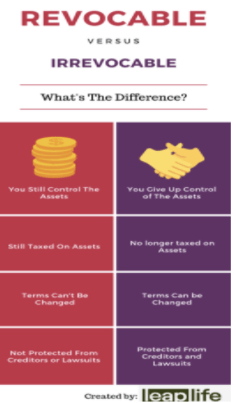A trust can be a useful instrument in planning your estate for the future. Basically a trust is a legal agreement or contract that gives an individual or an institution, such as a bank, the right to hold title to certain assets as they manage the benefits of these assets for others. Trusts can also have the added attraction of tax efficiencies on the assets under trust management. Probably the form of trust that you are most familiar with is a tangible trust, where trust companies provide safekeeping in vaults of physical assets like gold, jewelry or other collectibles. This is something that most individuals can do on their own without the help of a financial planner.
Creating a will, revocable trust or irrevocable trust starts by considering your goals and objectives. A trust can be a valuable tool in your overall wealth plan. In recent years, trusts have been favored as a common gifting mechanism and a potential tax shelter from creditors. But they are also costly and complex, and they are just one of several ways to protect your wealth. Before you go through the time and expense to create a trust consider what it is exactly that you are looking to do. With that said, trusts aren’t exclusively the domain of high net worth individuals. According to Perry Smith, vice president of Business and Estate Planning at Commonwealth Financial Group, “Contrary to popular belief, trusts are not just reserved for the wealthy. In fact, many people have more to protect and pass on than they think.”
When considering trusts there are two major types, revocable and irrevocable. Let’s take a look at each of them and compare the pros and cons.

By definition a revocable trust and a living trust are the same thing, with the primary objective being that terms of the trust can be changed at any time. Unlike the living trust, an irrevocable trust cannot be modified once it has been set up without the consent of the beneficiaries. With this given flexibility, revocable trusts have built in advantages like the ability to remove beneficiaries, designate new ones, and modify stipulations as to how assets within the trust are managed. Although the flexibility is significant, revocable trusts have several serious disadvantages that limit their use. Because the owner retains such a level of control over a revocable trust, the assets they put into it are not shielded from creditors the way they are in an irrevocable trust. Secondly, if the owner of a revocable trust is sued the trust assets can be ordered liquidated to satisfy any judgment put forth. Lastly, if the owner of a revocable trust dies, the assets held in the trust are then subject to both state and federal estate taxes.
Enter the irrevocable trust. Its necessity was born out of egregious tax laws. Taxation is the main reason to select an irrevocable trust. The downside is that these trusts cannot be changed after they are established. Examples of irrevocable trusts used for such tax purposes come in all shapes and sizes. Here are a few:
- Marital deduction trusts
- Qualified terminable interest property trusts (QTIPs)
- Credit shelter trusts
- Special needs trusts
- Domestic asset protection trusts (DAPTs)
- Dynasty trusts
- Grantor retained annuity trusts (GRATs)
- Qualified personal residence trusts (QPRTs)
- Charitable lead trusts
The irrevocable trust allows you to take advantage of the estate tax exemption essentially removing such assets from your estate. Hence, they do not count toward the gross value of your estate, which can be very useful for those with very large estates. Probably second to the tax benefits of the irrevocable trust would be the fact that it is set in stone. This prevents the misuse of assets by the beneficiaries, allowing the grantor to set conditions for distribution. A tertiary benefit falls under the gifting realm. Perhaps the primary advantage here is that even though you have gifted assets to the trust you can still retain any income derived from the gift.
Circling back to taxes, assets like a primary residence and proceeds from life insurance can be treated more favorably if placed into the trust. A final item that can be used in the irrevocable trust has to do with Social Security and Medicaid, which is something that involves most everyone, not just individuals with a high net worth. This will be touched on in more detail in a subsequent article, but what essential happens is that the trust is used to deplete one’s assets in order to remain eligible for Social Security and nursing home benefits, which can be huge to remaining beneficiaries. These trusts are also set up to secure ongoing benefits and care if a special needs child is involved, ostensibly allowing the child to continue receiving eligible benefits. These Social Security and Medicaid issues are reason alone to discuss creating a trust with a financial planner. Procrastination when it comes to estate planning can be the costliest enemy.











